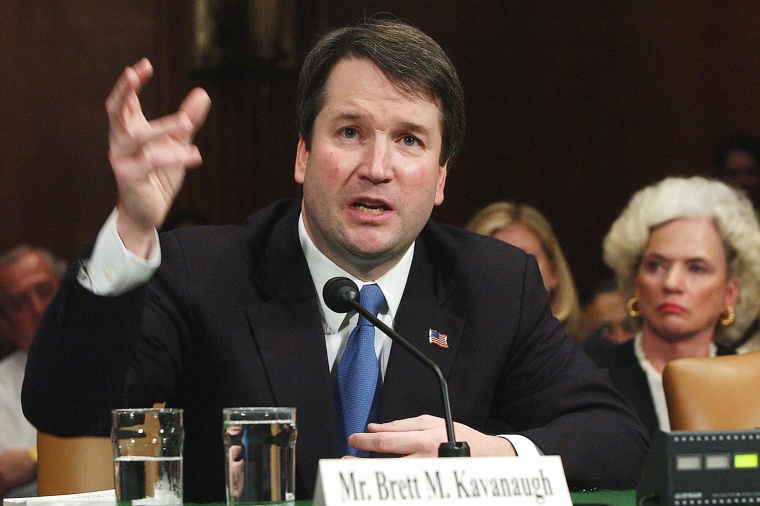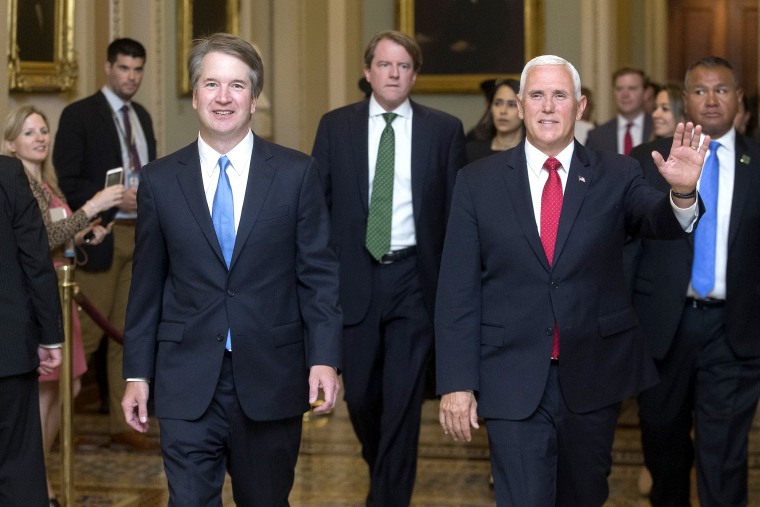Supreme Court nominee Judge Brett Kavanaugh has written almost 300 opinions on a range of issues over his 12 years serving on the U.S. Court of Appeals for the District of Columbia circuit. In an article for SCOTUSblog, Edith Roberts noted that “Kavanaugh generally brings a pragmatic approach to judging, although his judicial philosophy is conservative, and he has applied principles of textualism and originalism espoused by the late Justice Antonin Scalia.”
Here are some particularly significant decisions that reflect how Kavanaugh evaluates some of the most important issues in today’s political landscape:
Birth control and abortion
In a 2015 case, Priests for Life v. HHS, the District of Columbia Circuit Court of Appeals refused to allow a rehearing for a religious group’s challenge to an Obamacare requirement that employers provide birth control to employees. Kavanaugh dissented from that decision.
He argued that religious organizations should not be forced to provide contraception, falling in line with conservative thought on the issue. “Under Hobby Lobby,” Kavanaugh wrote, referring to an earlier Supreme Court decision, “the regulations substantially burden the religious organizations’ exercise of religion because the regulations require the organizations to take an action contrary to their sincere religious beliefs (submitting the form) or else pay significant monetary penalties.”

But breaking a little bit from some conservatives, he also argued that the government does have a compelling interest in facilitating access to contraception. In doing so, he followed the decision written by his mentor, Justice Anthony Kennedy, in the Hobby Lobby case.
“In light of the numerous benefits that would follow from reducing the number of unintended pregnancies, it comes as no surprise that Justice Kennedy’s opinion expressly referred to a ‘compelling’ governmental interest in facilitating women’s access to contraception,” Kavanaugh wrote.
In a more recent case, Garza v. Hargan, an undocumented teen was seeking an abortion, and when the appeals court ruled last year that she could temporarily leave immigration detention to obtain an abortion, Kavanaugh wrote a dissent, arguing that she did not have the right to “abortion on demand.”
Executive power
In a case last year, PHH Corp. v. Consumer Financial Protection Bureau, Kavanaugh dissented from an appellate ruling upholding the structure of the Consumer Financial Protection Bureau, a relatively autonomous agency created in the wake of the 2008 financial crisis and tasked with protecting consumer rights. The agency had been set up to isolate it from White House or congressional pressure. But Kavanaugh argued that the key danger in consolidating power in the single head of the bureau was the “absence of presidential supervision and direction.”
Environment
In 2012, he wrote a decision rejecting the EPA’s effort to decrease pollution across state lines, arguing that the agency was exceeding its statutory authority.
In the case, EME Homer City Generation v. EPA, Kavanaugh wrote that air pollution can affect both states where the pollution is emitted and other states that are downwind. Each state should have the right to regulate pollution on its own, he wrote.
While the federal government sets air quality standards, he wrote, “the states have the primary responsibility for determining how to meet those standards and regulating sources within their borders.” This decision was later reversed by the Supreme Court.
Health care
In a 2011 case, Seven-Sky v. Holder, the appeals court upheld the individual mandate to buy health insurance, a pillar of the Affordable Care Act. Kavanaugh wrote a dissent, saying the mandate was essentially a tax and thus outside the court’s jurisdiction. This argument later became central when the Supreme Court upheld the constitutionality of the ACA.
Gun control
In 2011, Kavanaugh wrote a dissent when the D.C. Circuit Court upheld a series of bans on assault weapons in Washington. Kavanaugh argued that the city’s ban on semi-automatic rifles was unconstitutional because it made an artificial distinction between handguns, which were permitted, and semi-automatic rifles, which were not.
“There is no meaningful or persuasive constitutional distinction between semi-automatic handguns and semi-automatic rifles,” he wrote. “Semi-automatic rifles, like semi-automatic handguns, have not traditionally been banned and are in common use by law-abiding citizens for self-defense in the home, hunting and other lawful uses.”
